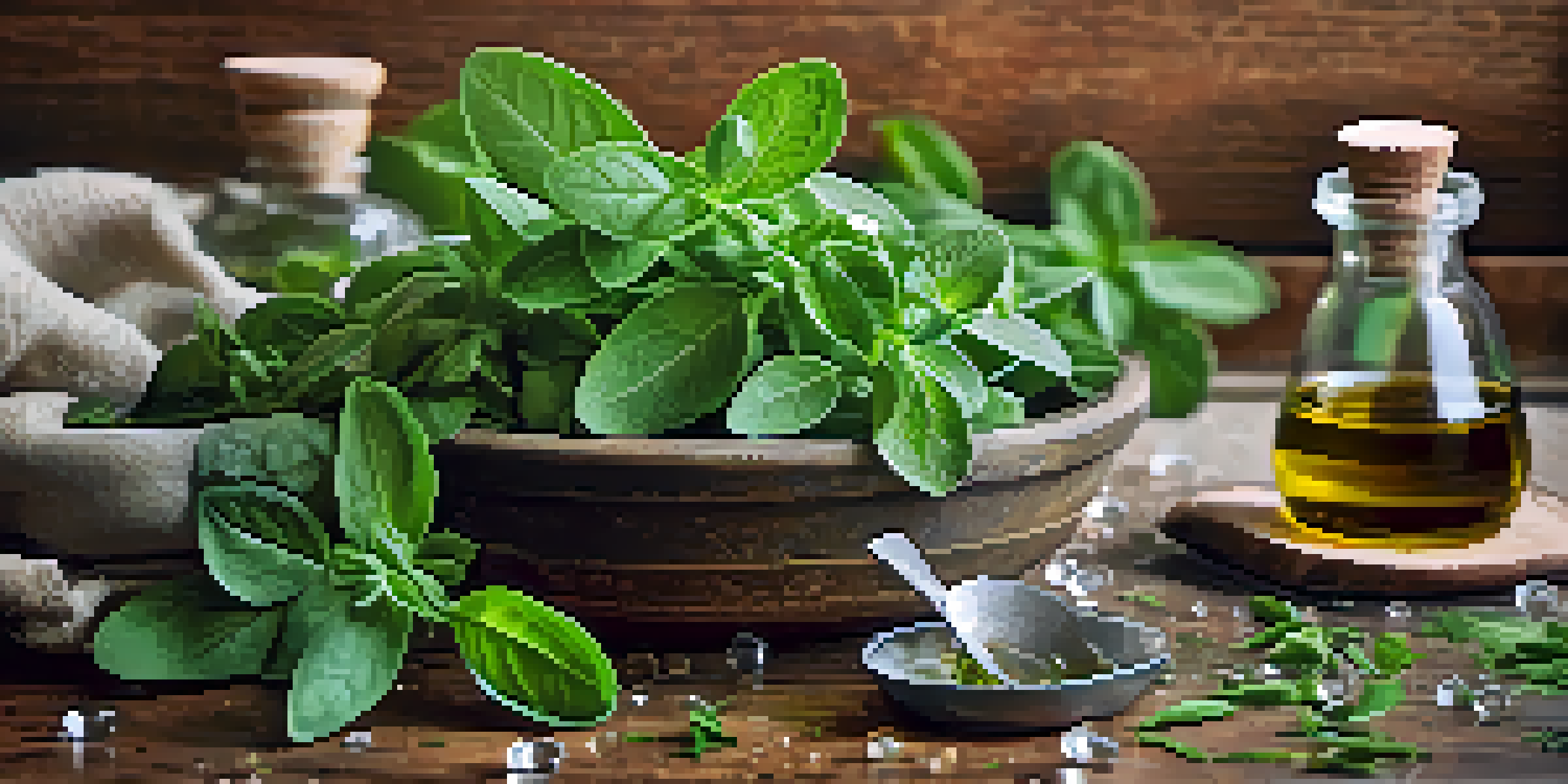Discovering the Antimicrobial Benefits of Oregano Oil

What is Oregano Oil and Its Origins?
Oregano oil is derived from the leaves of the oregano plant, known scientifically as Origanum vulgare. This herb is native to Europe, but it has made its way into kitchens worldwide, celebrated for its culinary uses and distinct flavor. However, beyond its role in Italian dishes, oregano oil is gaining attention for its potential health benefits, particularly its antimicrobial properties.
Herbs are the friend of the physician and the pride of cooks.
The oil is extracted through steam distillation, concentrating the plant's beneficial compounds. These compounds, such as carvacrol and thymol, are primarily responsible for its antimicrobial effects. As a result, oregano oil has become a popular natural remedy in alternative medicine, often hailed as a powerful ally against various pathogens.
With its rich history in traditional medicine, oregano oil is not just a flavorful addition to your meals; it might also play a crucial role in supporting your immune system. Understanding its origins helps to appreciate how this humble herb has transformed into a noteworthy health supplement.
Understanding Antimicrobial Properties
Antimicrobial properties refer to the ability of a substance to kill or inhibit the growth of microorganisms such as bacteria, viruses, and fungi. This is particularly important in today's world, where antibiotic resistance is a growing concern. Natural alternatives like oregano oil offer a potential solution, acting as a natural disinfectant and a means of maintaining health.

Research has shown that the active compounds in oregano oil, particularly carvacrol, can disrupt the cell membranes of harmful bacteria. This action makes it effective against a variety of pathogens, including E. coli and Salmonella, which can cause foodborne illnesses. This means that oregano oil can be a useful addition to your health toolkit, especially for those looking for natural remedies.
Oregano Oil's Health Benefits
Oregano oil offers a range of health benefits, including antimicrobial, anti-inflammatory, and antioxidant properties.
By understanding how antimicrobial properties work, we can better appreciate the role of oregano oil in maintaining health. It’s worth noting that while oregano oil can be beneficial, it should complement, not replace, conventional treatments when necessary.
Exploring Oregano Oil's Health Benefits
Oregano oil isn't just about fighting microbes; it offers a plethora of health benefits that extend beyond its antimicrobial properties. For instance, it's known for its anti-inflammatory effects, which can help reduce the symptoms of various conditions, including arthritis. Incorporating oregano oil into your daily routine might enhance your overall well-being.
Let food be thy medicine and medicine be thy food.
Additionally, oregano oil is packed with antioxidants, which help combat oxidative stress in the body. This is crucial for maintaining cellular health and preventing chronic diseases. Think of antioxidants as the body’s defense team, working to neutralize harmful free radicals that can damage our cells.
Moreover, oregano oil is sometimes used to alleviate respiratory issues. Its natural expectorant properties can help clear mucus and promote easier breathing, making it a supportive ally during cold and flu season. Overall, oregano oil presents a multi-faceted approach to health that many are beginning to embrace.
How to Use Oregano Oil Safely
While oregano oil is potent, it's essential to use it safely to avoid any adverse effects. One common method of use is through dilution; never apply it directly to the skin or ingest it without mixing it with a carrier oil or food. This helps to reduce the risk of irritation and enhances its absorption in the body.
Dosage is another critical factor to consider. It's always best to start with a small amount, such as a drop or two, and observe how your body responds. If you’re considering using oregano oil as a supplement, consulting a healthcare professional is a wise step to ensure it’s appropriate for your individual needs.
Safe Usage of Oregano Oil
To use oregano oil safely, it's important to dilute it and start with small doses, while consulting a healthcare professional if needed.
Using oregano oil in cooking is a fantastic way to enjoy its benefits while enhancing your meals. A few drops can elevate the flavor of sauces, dressings, and marinades, making it a versatile addition to your pantry. Just remember, moderation is key!
Oregano Oil in the Kitchen: Culinary Uses
Beyond its medicinal uses, oregano oil shines in the culinary world. Its robust flavor makes it a staple in Mediterranean cuisine, where it’s commonly used in dishes like pizza and pasta. A little goes a long way, so just a few drops can elevate your meal with a burst of flavor.
In addition to enhancing taste, oregano oil can also contribute to food preservation. Its antimicrobial properties can help inhibit the growth of bacteria in food, making it a natural preservative. This is particularly useful for those who want to incorporate more natural ingredients into their cooking.
You can also experiment with oregano oil in salad dressings and marinades. Mixing it with olive oil, vinegar, or lemon juice creates a delicious dressing that’s not only flavorful but also packed with health benefits. It’s a simple way to boost both your meals and your health!
Scientific Studies Supporting Oregano Oil
Numerous studies have explored the antimicrobial properties of oregano oil, lending scientific credibility to its traditional uses. For instance, research published in the Journal of Applied Microbiology demonstrated that oregano oil effectively inhibited the growth of foodborne pathogens. This kind of evidence reinforces the idea that nature can provide powerful solutions to health issues.
Another significant study highlighted oregano oil's effectiveness against respiratory viruses, suggesting that it might support respiratory health. As we continue to seek natural alternatives to chemical solutions, oregano oil stands out as a promising option backed by research.
Culinary Uses of Oregano Oil
Oregano oil enhances the flavor of dishes and can also act as a natural preservative due to its antimicrobial properties.
While more studies are needed to fully understand its effects, the existing research is encouraging. It’s vital for consumers to look for reputable sources and research when considering natural remedies, and oregano oil certainly fits the bill.
Potential Side Effects and Considerations
Even though oregano oil has many benefits, it’s not without potential side effects. Some individuals may experience allergic reactions or irritations, particularly if they have sensitivities to oregano or related plants. It’s always a good idea to perform a patch test before using it on your skin or trying it for the first time.
Moreover, pregnant or breastfeeding women should exercise caution and consult a healthcare provider before using oregano oil. Some herbal supplements can interact with medications or have contraindications, so it’s essential to prioritize safety.

Lastly, while oregano oil can be an excellent addition to your health routine, it should not replace prescribed medications. It’s best used as a complementary approach to health, working alongside conventional treatments to provide a holistic wellness strategy.